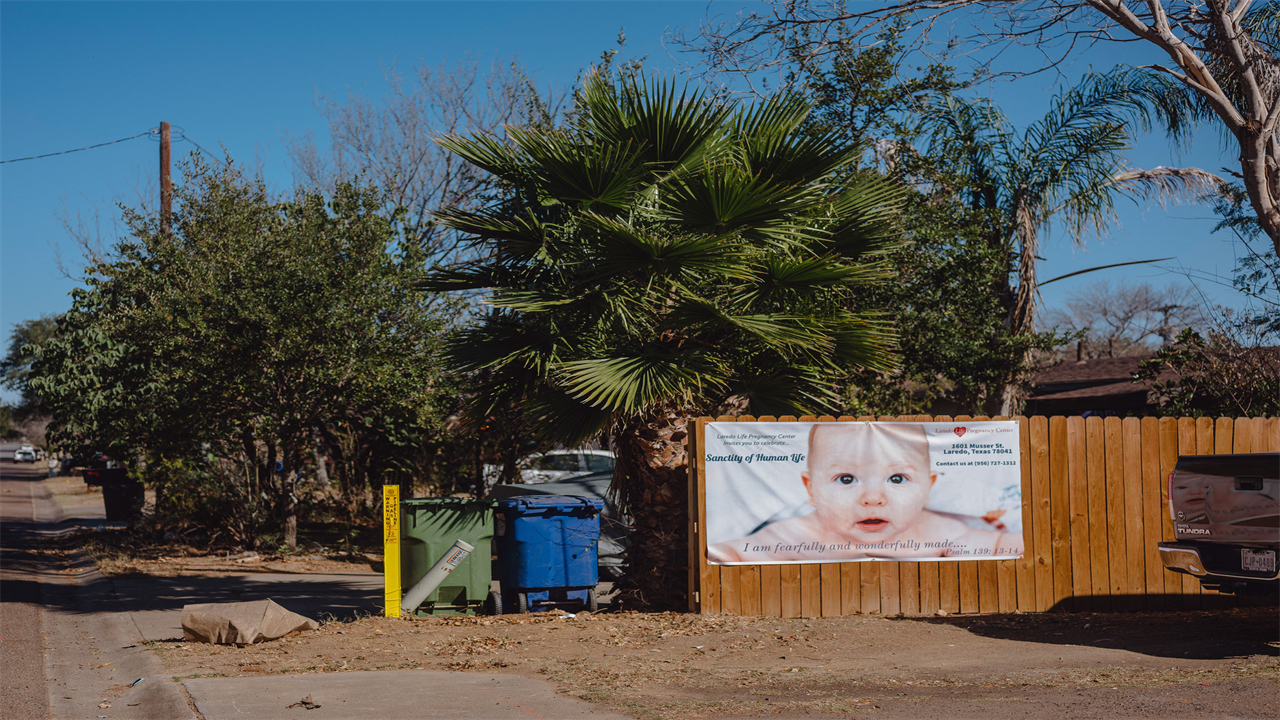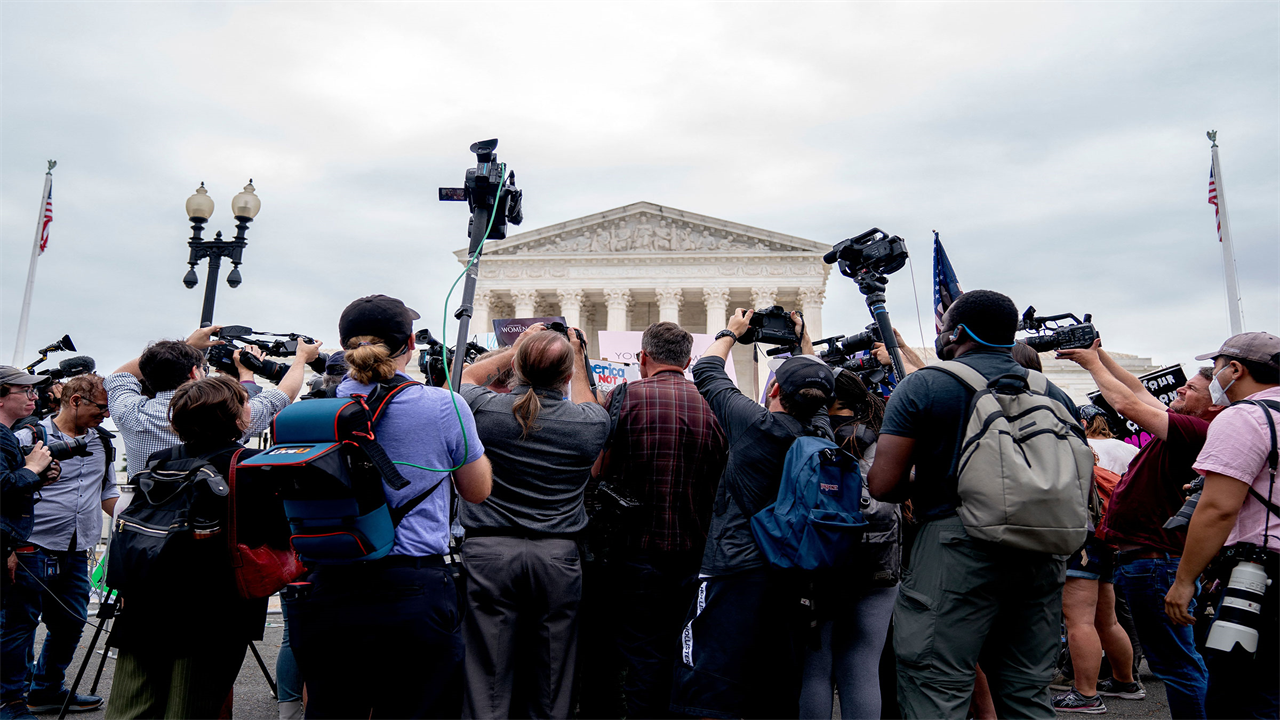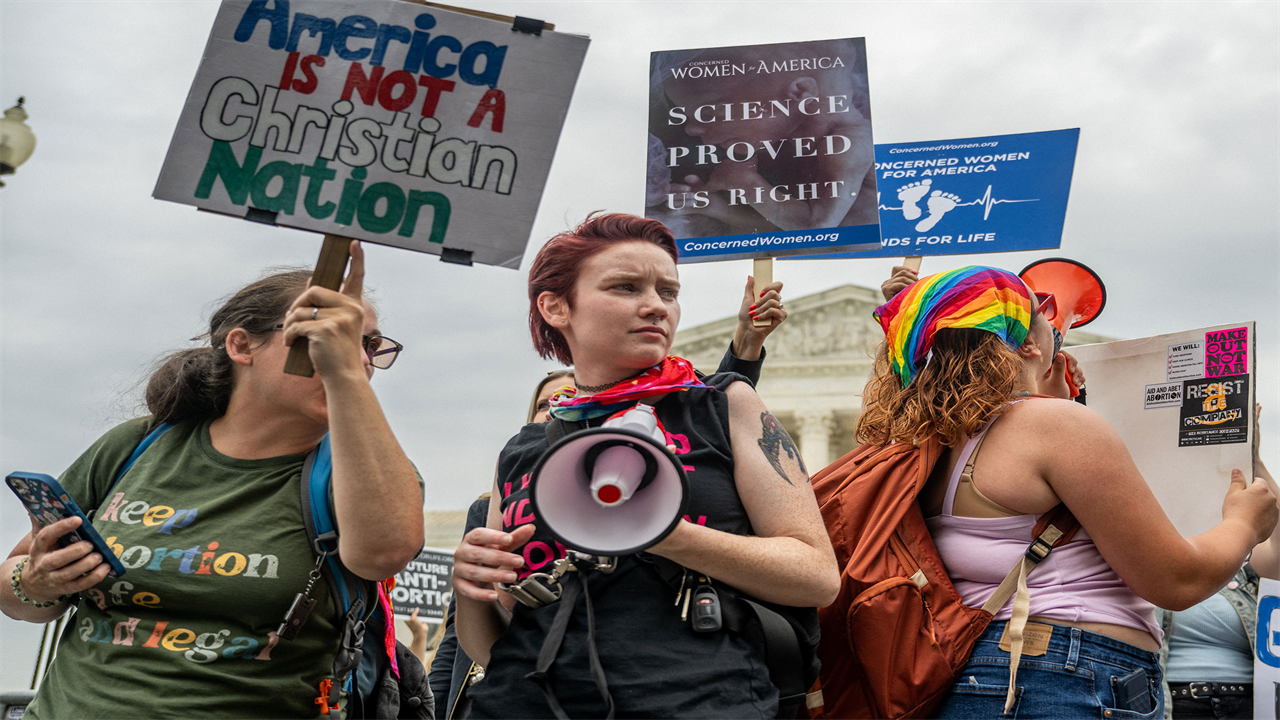Anti-Abortion Pregnancy Centers Are Collecting Troves of Data That Could Be Weaponized Against Women
0 View
Share this Video
- Publish Date:
- 22 June, 2022
- Category:
- Mental Health
- Video License
- Standard License
- Imported From:
- Youtube
Tags
The first alarm bell went off in Ashley’s head when no one at the Prestonwood Pregnancy Center was wearing a mask. No one was in scrubs, no one’s hair was tied up, and every staffer was wearing a visible cross. “I should have noticed all the red flags,” says Ashley, 28, whom TIME is identifying by her first name to protect her privacy. But it wasn’t until she sat down for a mandated counseling session in the brick building in a Dallas suburb that she realized what kind of a facility it was.
Ashley had Googled where she could confirm a positive pregnancy test and get an abortion. One of the first results had been a website called Choices Dallas offering “pre-screening abortion consultations.” That had led her to Prestonwood, one of more than 2,500 anti-abortion centers, sometimes known as “crisis pregnancy centers,” that have exploded across the U.S. in the past two decades, fueled by an increasingly powerful anti-abortion movement. This sprawling network of unregulated, faith-based nonprofits now outnumbers abortion clinics 3 to 1.[time-brightcove not-tgx=”true”]
Many of the millions of women who visit these pregnancy centers stumble into them by accident, as Ashley did. The centers often present themselves as medical facilities and mirror abortion clinics’ logos, using names like Your Choice and Women’s Health Clinic. Prestonwood’s—a P at the center of three concentric circles—looks very similar, for instance, to that of Planned Parenthood. Pregnancy centers’ billboards—Pregnant? Scared? Need help?—blanket highways, and their well-funded parent organizations offer trainings in Google Ads, search-engine optimization, and social marketing to ensure they appear atop search results. Their goal is to dissuade women from having abortions by promoting parenting and adoption, and offering baby supplies and counseling. But researchers and doctors have found they also provide misinformation about abortion. More than half a dozen women who sought care at such centers told TIME that staff used a variety of scare tactics, including gory videos.Ashley had gone to Prestonwood in hopes of getting an ultrasound and information about abortion. She has a medical condition that puts her at high risk of an ectopic pregnancy, in which a fertilized egg implants outside the uterus. An egg cannot survive the condition, which can also threaten the life of the pregnant person. But Ashley says the Prestonwood counselor told her, falsely, that she could carry an ectopic pregnancy to term if she was “careful,” and urged her to delay a decision to terminate the pregnancy. “I said, ‘OK, so you want me to wait until it becomes illegal for me to get an abortion?’” Ashley recalls, referring to a recent Texas law that bans abortions after roughly six weeks of pregnancy. After leaving the center, Ashley broke down in tears in her car. A Prestonwood spokesperson told TIME that it “abides by all relevant laws and regulations,” respects client privacy, and prioritizes “the health of both mother and child.”Ashley was later able to see a doctor and terminate her pregnancy within the time period that Texas law still allows. But her visit to Prestonwood haunted her. In her interactions with the center, both over the phone and in person, she had unknowingly provided a ream of personal information to a religious anti-abortion group. She began to wonder what they would do with that data. “They scanned my ID. They know where I live, they know my name, they have my f-cking license number. It felt like a completely different violation.”
Christopher Lee—The New York Times/ReduxAn anti-abortion sign outside Laredo Life Pregnancy Center, a maternal health facility in Laredo, Texas, on Feb. 17, 2022.Her concerns are not unfounded. While privacy worries about location data and health apps have dominated recent headlines about sensitive abortion data, the troves of personal information that pregnancy centers collect and store arguably pose a much more immediate privacy risk, legal and privacy experts tell TIME. Pregnancy centers, many of which are affiliated with national anti-abortion advocacy groups, including Care Net and Heartbeat International, collect personal data from the millions of women they interact with every year in person, by telephone, and through online chats. This data includes sexual and reproductive histories, test results, ultrasound photos, and information shared during consultations, parenting classes, or counseling sessions, which some pregnancy centers require before they provide aid, like diapers. Because most centers are not licensed medical clinics and offer services for free, privacy lawyers tell TIME that they are not legally bound by federal health data privacy laws.With the Supreme Court poised to overturn Roe v. Wade, these largely unregulated databases could be exploited in the wake of conservative efforts to criminalize abortion. Lawmakers in three states have already passed laws allowing private citizens to sue abortion providers, or in two states, anyone who aids in an abortion; other proposed bills target the pregnant woman herself. Pregnancy centers’ databases could be used as evidence in both launching and pursuing such legal actions. Because pregnancy centers often focus on outreach to women of color in urban areas, according to their own strategy reports, their clients are already disproportionately more likely to be surveilled and scrutinized by law enforcement.“We anticipate that we will see a dramatic increase in the criminalization of pregnant people for self-managed abortion and pregnancy outcomes,” says Kim Clark, a lawyer at Legal Voice, a women’s-rights nonprofit in Seattle. “Pregnancy centers are just perfectly positioned to facilitate those investigations.”The national anti-abortion organizations that run the largest networks of pregnancy centers say they protect their clients’ privacy. “That data is secure,” Heartbeat International spokeswoman Andrea Trudden tells TIME. “Any information that we publish and pull is just numbers, so we’re not looking at any of that [personal] information.” But some abortion-rights advocates point to conflicts of interest: Heartbeat, which runs the largest network of pregnancy centers in the U.S. with 1,800 affiliates, also lobbies for bills criminalizing abortion.From law enforcement to human rights, one of the lessons of the past few decades is that privacy violations follow the creation of unregulated troves of data. Now, with the rollback of abortion rights on the horizon, the cache of data on pregnant women represents arguably the most intrusive front yet. “It’s just nuts,” says Mary Jo Daley, a Democratic state representative in Pennsylvania, who introduced a bill directed at pregnancy centers. “They’re collecting all this information, and you don’t know how they’re gonna use it because they’re not health care providers. And women don’t know that. It’s frightening.”Small, locally operated pregnancy centers first cropped up in the 1960s, as mostly Catholic groups looked to prevent abortion by offering mothers counseling and social-service referrals. After the Supreme Court established a constitutional right to abortion in 1973, larger groups, including evangelical activists, joined the so-called “pregnancy help movement,” according to the Charlotte Lozier Institute, an anti-abortion think tank associated with Susan B. Anthony Pro-Life America. As the movement grew larger, advocates began organizing independent pregnancy centers into networks, featuring annual conferences, training sessions, and digital and legislative strategies. What had once been mom-and-pop storefronts became the scaffolding of the national anti-abortion movement.

Stefani Reynolds—AFP/Getty ImagesMembers of the media gather around anti-abortion and abortion activists demonstrating outside the Supreme Court in Washington, on June 21, 2022. Pregnancy centers “go out of their way to perpetuate that idea that they’re just volunteers trying to help at a storefront on the corner,” says Megan Peterson, the executive director at the legal nonprofit Gender Justice. “There’s a whole machine behind them.”By the late ’90s, conservative state lawmakers were channeling government funds to pregnancy centers to launch programs promoting sexual risk avoidance and alternatives to abortion. Close to 20% of pregnancy centers nationwide now receive public funding. Twelve states funnel up to $8 million in taxpayer money every year to pregnancy centers, according to a 2021 report from Equity Forward, a reproductive-rights research firm; Texas provides much more than that: $50 million a year. At least 33 states and the District of Columbia raise money for these centers by selling specialty choose life license plates, and at least 10 states have diverted funds to pregnancy centers from the federal Temporary Assistance for Needy Families program, which gives states block grants meant to help vulnerable families meet basic needs, including food, rent, and child care.As pregnancy centers spread nationally, many rebranded themselves as medical clinics, borrowing the language and imagery of women’s clinics—photos of people in white coats and exam tables—in their promotional materials. Today, the vast majority of centers do not provide even basic women’s health care, like Pap smears, and many oppose the use of birth control. But 77% offer non-diagnostic ultrasounds, which do not provide any information about the health of an embryo, according to research by Andrea Swartzendruber, an associate professor at the University of Georgia College of Public Health.This decision to “go medical” was part of a national strategy to draw in more women explicitly considering abortion, according to the Charlotte Lozier Institute. But the shift also compounded confusion over what the centers do. “Our data show that many people who go to crisis pregnancy centers have misconceptions about what the centers are,” says Swartzendruber, who surveyed people who visited Georgia pregnancy centers. Many were “expecting an abortion facility or a medical facility.”The ambiguity has been aided by internet search results. In the 13 states that are set to ban abortion quickly if Roe is overturned, nearly 40% of Google Maps searches for “abortion clinic near me” and “abortion pill” led to pregnancy centers, according to the misinformation research nonprofit Center for Countering Digital Hate. The top two search results for “abortion in Dallas” lead to pregnancy-center organizations, including Choices Dallas, the website that Ashley used.In the past decade, pregnancy centers again shifted their strategy, this time focusing on the power of data. In 2017, Heartbeat International rolled out a new data-collection system for its pregnancy centers. “Big data is revolutionizing all sorts of industries,” its marketing materials trumpeted. “The data your organization collects needs to work not just for you, but for the rest of the pregnancy help movement.” Major pregnancy-center networks now use data-collection interfaces to track women who interact with their organization in person, on the phone, or online. Calling Heartbeat International’s 24-hour hotline, which the organization says fields some 1,100 calls a day, or using its online chatbot both require that a visitor provide her name, location, demographic information, and what she plans to do with her pregnancy.These data-collection systems allow pregnancy centers to create “digital dossiers” of women, according to a 2020 report by U.K.-based civil rights group Privacy International, which warned that while these technologies “collect and centralise vast amount of people’s private information,” it’s unclear who the data is shared with. “You don’t need to physically go to a crisis pregnancy center anymore for them to harvest your data,” says Tara Murtha of Women’s Law Project, a legal-advocacy group. “They have it the moment you seek help on their website [or] use the chat app.”During in-person consultations and counseling sessions, pregnancy-center staff use the same data systems, which often feature drop-down menus or color-coded systems to categorize how likely a client is to get an abortion.Perhaps most worrisome to abortion rights advocates is the trend among pregnancy centers to reach out to women who have already had abortions, often by offering post-abortion counseling. Heartbeat International also runs an “abortion-pill reversal” hotline directed at women who have started medical abortions. While the American College of Obstetricians and Gynecologists says there’s no scientific evidence suggesting that abortion-pill reversal works, the women who call the hotline asking about it are still asked to provide personal data. If abortion is illegal, that interaction carries potential legal implications, says Murtha. “You’re on record,” she says, “as having been pregnant and attempted an abortion.”Unlike data gathered at real medical clinics, client information collected by pregnancy centers is mostly unregulated by federal law. The centers are not generally subject to federal privacy laws, including the Health Insurance Portability and Accountability Act (HIPAA), which governs health care settings. State privacy laws vary widely, but only a few states require pregnancy centers offering medical services to be licensed, according to a 2020 report from the Charlotte Lozier Institute.In reviewing more than two dozen pregnancy-center privacy disclosures, TIME found that many reference HIPAA and assure broad data privacy. But most of the time, such promises are legally toothless since HIPAA does not apply, says Shannon Hartsfield, a lawyer at Holland & Knight who focuses on corporate compliance and data privacy. “They may say, ‘Oh, we keep everything confidential,’” she says, “but it’s going to be hard to know for sure without legal standards.”The fine print on pregnancy-center forms and websites is also expansive. According to the terms of use on Heartbeat International’s data management system, the organization can share any and all client information with any “affiliates, partners, vendors, or contract organizations, or as legally necessary.”

Many pregnancy centers’ privacy disclosures note that they are not bound by federal medical-privacy laws, including HIPAAAntiabortion leaders, as well as staff at local pregnancy centers, tell TIME that they have no intention of breaching their clients’ privacy. In May, after Louisiana lawmakers advanced a bill classifying abortion as homicide and allowing pregnant women to be charged, a coalition of anti-abortion groups published an open letter urging state legislators to stop. “The mainstream pro-life movement absolutely opposes prosecuting women, and that extends to pregnancy centers,” National Right to Life Committee spokesperson Laura Echevarria tells TIME. The sponsor of the Louisiana bill later pulled it in the face of public opposition.Echevarria and others say pregnancy centers are a crucial part of the future of maternal care. A Heartbeat International survey showed that 41% of centers in Texas and surrounding states have seen an uptick in clients since Texas’ abortion ban took effect in September. Heartbeat spokeswoman Trudden says the organization’s primary concern is the recent increase in vandalism and threats to its centers, not data security. Even as abortion clinics have moved to paper forms and encrypted apps to protect clients’ information, Trudden says their centers are not making changes: “We have not received increased concerns by pregnancy-help organizations regarding their data security.” Echevarria adds that pregnancy centers have a “vested interest” in fighting law-enforcement requests to access their databases. “It would completely undermine and destroy the mission of pregnancy centers,” she says, “to have to give that information to anybody, to any court of law.”But the legal landscape is changing rapidly. Texas’ six-week abortion ban offers a $10,000 reward to anyone who wins a civil case against either an abortion provider or someone who aided in an abortion. Oklahoma also offers $10,000 in its sweeping abortion ban, which went into effect in May. A similar law in Idaho is only blocked in court because Roe is still standing. On June 15, National Right to Life released a model bill that would ban nearly all abortions, allow local officials and some private citizens to sue violators, and make punitive damages payable to nonprofits, including pregnancy centers.In cases filed under these laws, lawyers could subpoena information from pregnancy centers, legal experts say. While most states don’t currently allow pregnant women to be punished for violating abortion restrictions, there’s a precedent for using such data to arrest or threaten legal action against women. There have been more than 1,700 instances since 1973 in which law enforcement arrested or took legal action against women in cases related to their pregnancies, according to the National Advocates for Pregnant Women; in some of the more recent cases, internet search histories and information gathered by medical professionals were presented as evidence. Last summer, the National Association of Defense Lawyers warned of an impending legal storm: if Roe is overturned, state anti-abortion laws “will open the door to mass criminalization on an unprecedented scale.”

Brandon Bell—Getty ImagesAnti-abortion and abortion rights demonstrators rally in front of the Supreme Court Building on June 21.By offering a substantial monetary reward, the Texas, Oklahoma, and Idaho laws, and the National Right to Life model bill, potentially create a powerful motivation for anyone who has access to pregnancy-center databases. “The data,” says Peterson of Gender Justice, “literally has a price tag on it.” That includes pregnancy-center staff, partners, vendors, and contract organizations, the staff of which are presumably involved in this advocacy work because they believe that having an abortion is tantamount to murder. A front-desk attendant and spiritual counselor at Brazos Pregnancy Center in Texas who declined to give her name told TIME that while the center’s goal was to protect “the client and their baby,” she personally is “in the middle” on whether a woman should face criminal charges for having an abortion. The Opelousas Pregnancy Center in Louisiana goes further: its policies promise to treat clients “with kindness, compassion and in a caring manner,” while also asserting, “Abortion by any means for any reason is unjustified…and an act of murder.”Pregnancy centers’ increasingly close ties to state governments present yet another concern, multiple legal and privacy experts tell TIME. Last year, Arkansas passed a law requiring women seeking an abortion to call an abortion-alternatives hotline, which in many cases would direct them to a pregnancy center. The same law requires that such callers be given a unique identifying number, which would then be registered in a state database. Five other states are considering similar legislation. Arkansas state representative Jim Dotson, who authored the bill, told TIME that he opposes efforts to criminalize pregnant women and said the data gathered would be secure. But privacy experts say current law cannot ensure that. In May, Daley, the Pennsylvania Democrat, introduced a bill barring the 156 pregnancy centers in the state from sharing women’s health data without their consent. They get state money, Daley tells TIME, “but they are not transparent, they’re not accountable.”Meanwhile, Ashley, the woman who visited the pregnancy center near Dallas, says that she’s not sure where her data is stored or who has access to it, and she can’t help but feel that someone is looking over her shoulder. “I was within the legal bounds [to have an abortion],” she says. “But honest to God, it would not surprise me if someone were to knock on my door to see if I was still pregnant. I mean, it’s terrifying.”With reporting by Leslie Dickstein and Simmone Shah














